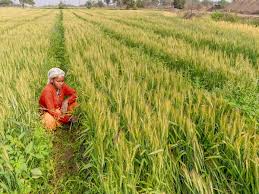Financing Sustainable Agriculture: Insights from the RBI

- 18 Sep 2024
Context
At the International Research Conference, the Deputy Governor of the Reserve Bank of India (RBI) addressed the crucial topic of financing sustainable agriculture, emphasizing the need for effective solutions.
What is Sustainable Agriculture?
Sustainable agriculture involves farming practices that meet current food demands while conserving resources for future generations. This approach aims to:
- Protect the environment
- Reduce reliance on chemical inputs
- Efficiently use water and land
The goal is to balance productivity, environmental health, and socio-economic equity.
Benefits of Sustainable Agriculture
- Environmental Conservation: Promotes biodiversity, reduces soil degradation, and conserves water.
- Economic Stability: Lowers dependence on costly chemical inputs, improving farmers’ profitability.
- Improved Food Security: Enhances soil health and crop diversity, ensuring resilience against climate change.
- Social Equity: Farmer Producer Organizations (FPOs) empower small and marginal farmers by providing access to technology, markets, and financial resources, enhancing their bargaining power.
Challenges Facing Sustainable Agriculture
- Low Productivity: Small, fragmented landholdings hinder investment in sustainable practices and mechanization.
- Dependence on Rainfall: Approximately 60% of Indian agriculture is rain-fed, making farmers vulnerable to climate variability.
- Price Volatility: Fluctuating prices force farmers to sell at low prices during peak harvests, while limited processing capacity leads to post-harvest losses.
- Access to Finance: Small farmers struggle to obtain credit, as the formal banking system often favors larger agribusinesses.
Initiatives for Sustainable Agriculture
- Farmer Producer Organizations (FPOs): Over 24,000 FPOs formed by March 2023 enhance farmers’ access to resources and markets.
- Warehouse Receipt Financing: This model allows farmers to store produce and sell when prices are favorable, stabilizing commodity prices.
- Priority Sector Lending (PSL): RBI regulations enable loans up to ?2 crore for agricultural activities, with higher limits for FPOs involved in assured marketing.
- Climate-Smart Agriculture (CSA): India is adopting practices such as drought-resistant crops and advanced water management.
- Technology Integration and Mechanization: Initiatives like the “Per Drop More Crop” scheme promote efficient water use, while Custom Hiring Centres (CHCs) enhance mechanization, reducing labor costs.
